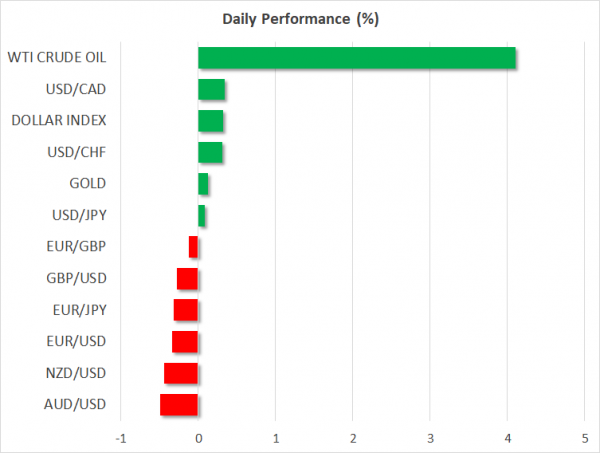- Euro surrenders some gains as EU fails to agree coordinated fiscal plan
- Besides euro, US stock futures also retreat on Eurobond disappointment
- Has the bear market rally gone too far?
- Oil crumbles as doubts about production cuts set in – even if they cut, it won’t be enough
Eurobonds get a cold reception, euro struggles
The Eurozone’s institutional deficiencies came back on the market’s radar today, after a lengthy meeting of the bloc’s finance ministers ended without an agreement on coordinated fiscal measures to assist the economies most ravaged by the pandemic. The real obstacle seems to be disagreement around a common debt instrument to fund the virus-fighting stimulus, a so-called ‘coronabond’ that would be a de-facto Eurobond, with Germany and the Netherlands opposing the notion.
Although the negotiations will continue tomorrow, the conflict served as a reminder that the EU’s rigid spending rules will amplify the problems in nations like Italy and Spain, which are fiscally weaker and thus cannot launch the colossal stimulus they need on their own.
Naturally, the euro didn’t like the news as they implied a deeper recession and a slower recovery. The single currency gave back some of the gains it posted yesterday, when it capitalized on stronger risk appetite and a weaker dollar.
Overall, the outlook for the euro remains grim. While in the near term a lot will depend on how risk sentiment evolves, absent an agreement on Eurobonds, the bigger picture is one where Europe’s economy is savaged by this pandemic without proper stimulus to help it weather the impact. And if this crisis isn’t enough to push the EU towards a proper fiscal union, it’s difficult to see what will.
US virus numbers knock the wind out of stocks
It was a strange session yesterday, with US equities surrendering early gains to close in the red, after trading higher by 3.5% at one point. The catalyst for this massive reversal was the latest set of virus numbers out of New York, where even though the ‘curve is flattening’, new infections and fatalities are still rising quickly. That pushes any opening up of the economy further into the future.
As for today, while Wall Street futures initially pointed to a higher open, those gains have mostly evaporated after the Eurogroup failed to reach an accord, highlighting that the EU’s deficient institutional structure is also a global issue, not just a regional one.
Looking ahead, it’s still tough to have any confidence in the recent stock recovery. How much of this rebound came down to rebalancing and short-covering after the massive losses? Moreover, will this serenity last as economic data begin to reveal the true extent of the damage and a parade of multinationals astronomically downgrade their forecasts when the earnings season begins next week?
The longer run picture is equally distressing. Many talk about a V-shaped or a U-shaped recovery when economies finally reopen. But considering how rapidly jobs are being lost, what impact that will have on long term consumer habits, and how many smaller companies will probably go out of business, we might be facing a recovery as drawn out and frail as the aftermath of 2008. Stock markets could gradually come to that realization too.
Oil retreats as skepticism sets in
Crude prices retreated yesterday, amid doubts about how effective even a 10 million barrel production cut by OPEC and its allies would be in stabilizing a market that’s about to see 20-30 million barrels in demand wiped out.
While it’s looking increasingly likely that some production-cut deal will be hashed out, it might indeed be ‘peanuts’ relative to the demand destruction, keeping the market grossly oversupplied. Hence, while prices could jump on a potential deal, that won’t be a game changer for oil, and any gains may be short-lived. A similar story would be true for the Canadian dollar.
As for today, the minutes of the latest FOMC meeting will probably be seen as outdated. The Fed has already fired the big guns.

